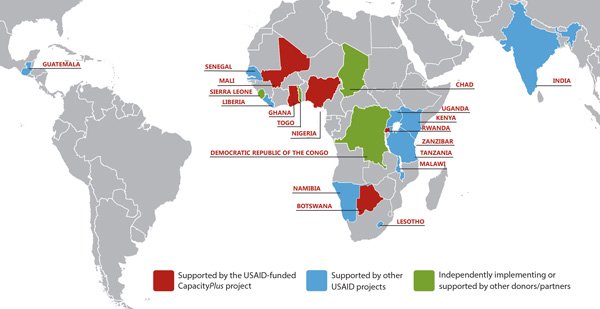Countries Save $177 Million with iHRIS
We know that iHRIS helps save lives by allowing countries to place health workers where and when they are most needed. But it also saves money. A lot of money.
Annually iHRIS gives the 19 nations that use its open source software the opportunity to save $177 million. Without iHRIS, that money would be spent on licensing fees alone.
That’s money that iHRIS nations can reinvest in their people, systems, and infrastructure to improve the health and lives of their citizens.

The Real Value of iHRIS
That $177 million figure, impressive as it is, is not the whole story. The real-dollar value of iHRIS extends beyond licensing fees.
Consider the other benefits that accrue to nations that implement iHRIS systems:
- Free customization, support, and ongoing updates of the software
- Optional modules and systems to expand iHRIS functionality
- A global community of developers constantly working to improve and expand the software
All these benefits spell additional savings. The updates and support volunteered by the iHRIS community would cost nations more than US $30 million or more each year if they were using proprietary software.
Now consider the benefits that are hard to put a price tag on, but that have clear value in human terms:
- Local empowerment: countries take control of the development and direction of their health information management.
- Global partnership: a community of developers, implementers, and users support one another to make iHRIS better.
- Development of local skills: iHRIS implementers encourage local solutions to national needs.
These additional benefits put the real value of iHRIS far beyond the $177 million figure. Ultimately, the value of iHRIS does not rest on the fact that iHRIS is free of charge, but on the fact that iHRIS results in a better product with plenty of support. To do what iHRIS can do “right out of the box,” proprietary systems often need costly customizations. iHRIS’s adaptability to local needs alongside its zero-dollar price tag is why more and more nations are coming on board.
Every Voice Adds Value
Because iHRIS is built on the principles of sharing and learning from one another, everyone in the community is valued, and everyone adds value. While saving money is a great reason to choose iHRIS, open source offers much more than dollar value.
Ricardo Lopez, iHRIS technical advisor, spoke to us recently about what iHRIS means to him and to his nation of Guatemala. Here is an excerpt from that interview:
What is the value of iHRIS and its open source software to you and to your country?
Guatemala doesn’t have that much money to buy expensive proprietary software. So iHRIS is a big opportunity to have a great product without having to pay an outside group expensive licenses.
What does it mean to you to do this kind of work?
Every day in the news I see that people don't have good health because the area where they live doesn't have medicine. They don’t have a doctor. They don’t have a nurse. They have big problems with nutrition. I want my country to have a good health service, to know where we need doctors, nurses, and other health-related resources. For me personally, it's very important to help, to improve how information is managed. The rural areas especially need help to manage their data.
What is it about working with open source and the iHRIS community that you especially value?
Working in an open source community gives me the chance to work with people who make incredible contributions in programming. I do this kind of work because of the open source ideology. Everybody can use the code. The community can share all the knowledge.
With proprietary systems, it’s very difficult to access information, to access new developments. Everything costs a lot of money — the courses, the licenses, the tools. Everything has a cost. With open source, you obtain a good software at no cost. I prefer open source software because I think it’s the fairest approach.
Versatility Equals Ever-Expanding Value
To put the final decimal point in place, factor in the versatility of iHRIS. iHRIS open source software can easily be adapted to broaden its functionality, and its value, in response to a need.
Take Tanzania as an example. iHRIS implementer Juma Lungo is adapting iHRIS to track all the assets of his Computer Science Department at the University of Dar es Salaam, assets such as furniture, computers and supplies.
iHRIS implementer Bakari Bakari, also in Tanzania, is customizing iHRIS to track all public employees, extending use of the system beyond health workers. This expansion of iHRIS in Tanzania increases the value of iHRIS from $177 million to more than $200 million annually.
As iHRIS Community Manager Michael Drane puts it: “This is why iHRIS is such an asset for the nations that implement it. It’s always inherently of greater value, because at any given moment it can be adapted to suit additional needs.”
iHRIS isn’t just software that saves nations money. iHRIS helps train a workforce of empowered and creative individuals working together to improve lives, resulting in an end product tailored to each nation’s different needs.
